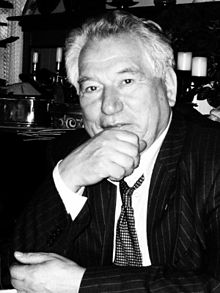- Chinghiz Aitmatov
-
Chinghiz Aitmatov 
Born December 12, 1928
Sheker, Kirghiz ASSR, USSRDied June 10, 2008 (aged 79)
Nuremberg, GermanyGenres Fiction Notable work(s) Jamilya Chyngyz Aitmatov (Kyrgyz: Чыңгыз Айтматов [tʃɯŋˈʁɯs ɑjtˈmɑtəf]; Russian: Чинги́з Тореку́лович Айтма́тов; Turkish: Cengiz Aytmatov) (12 December 1928, Sheker, Kirghiz ASSR, USSR - 10 June 2008, Nuremberg, Germany[1]) was a Soviet and Kyrgyz author who wrote in both Russian and Kyrgyz. He was the best known figure in Kyrgyzstan's literature.
Contents
Life
He was born to a Kyrgyz father and Tatar mother. Aitmatov's parents were civil servants in Sheker. In early childhood, Aitmatov wandered as a nomad with his family, as the Kyrgyz people did at the time. In 1937 his father was charged with "bourgeois nationalism" in Moscow, arrested and executed in 1938.[1]
Aitmatov lived at a time when Kyrgyzstan was being transformed from one of the most remote lands of the Russian Empire to a republic of the USSR. The future author studied at a Soviet school in Sheker. He also worked from an early age. At fourteen he was an assistant to the Secretary at the Village Soviet. He later held jobs as a tax collector, a loader, an engineer's assistant and continued with many other types of work.
In 1946 he began studying at the Animal Husbandry Division of the Kirghiz Agricultural Institute in Frunze, but later switched to literary studies at the Maxim Gorky Literature Institute in Moscow, where he lived from 1956 to 1958. For the next eight years he worked for Pravda. His first two publications appeared in 1952 in Russian: "The Newspaper Boy Dziuio" and "Ашым." His first work published in Kyrgyz was "Ак Жаан" (White rain, 1954), and his well-known work "Jamilya" (Jamila) appeared in 1958. 1980 saw his first novel The Day Lasts More than a Hundred Years; his next significant novel, The Scaffold was published in 1988. The Day Lasts More than a Hundred Years and other writings were translated into several languages. In 1994, he was a member of the jury at the 44th Berlin International Film Festival.[2]
Aitmatov suffered kidney failure, and on 16 May 2008 was admitted to a hospital in Nuremberg, Germany, where he died of pneumonia on 10 June 2008 at the age of 79.[1] After his death, Aitmatov was flown to Kyrgyzstan, where there were numerous ceremonies before he was buried in Ata Beyit cemetery, which he helped found[3] and where his father most likely is buried,[4] in Chong-Tash village, Alamüdün district, Chüy oblast, Kyrgyzstan.
His obituary in The New York Times characterized him as "a Communist writer whose novels and plays before the collapse of the Soviet Union gave a voice to the people of the remote Soviet republic of Kyrgyz" and adds that he "later became a diplomat and a friend and adviser to the Soviet leader Mikhail Gorbachev."[5]
Work
Chinghiz Aitmatov belonged to the post-war generation of writers. His output before "Jamilya" [6] was not significant, a few short stories and a short novel called Face to Face. But it was Jamilya that came to prove the author's work.[6] Aitmatov's representative works also include the short novels Farewell, Gulsary!,[7] The White Ship, The Day Lasts More Than a Hundred Years,[8] and The Scaffold.
Aitmatov was honoured in 1963 with the Lenin Prize for Tales of the Mountains and Steppes (a compilation including "Jamilya", "First Teacher" and "Farewell Gulsary") and was later awarded a State prize for Farewell, Gulsary!.[7] Aitmatov's art was glorified by admirers.[9] Even critics of Aitmatov mentioned the high quality of his novels.[10]
Aitmatov's work has some elements that are unique specifically to his creative process. His work drew on folklore, not in the ancient sense of it; rather, he tried to recreate and synthesize oral tales in the context of contemporary life. This is prevalent in his work; in nearly every story he refers to a myth, a legend, or a folktale.[1] In The Day Lasts More Than a Hundred Years, a poetic legend about a young captive turned into a mankurt serves as a tragic allegory and becomes a significant symbolic expression of the philosophy of the novel.
A second aspect of Aitmatov's writing is his ultimate closeness to our "little brothers" the animals, for their and our lives are intimately and inseparably connected. The two center characters of Farewell, Gulsary! are a man and his stallion. A camel plays a prominent role in The Day Lasts More Than a Hundred Years; one of the key turns of the novel which decides the fate of the main character is narrated through the story of the camel's rut and riot. The Scaffold starts off and finishes with the story of a wolf pack and the great wolf-mother Akbara and her cub; human lives enter the narrative but interweave with the lives of the wolves.
Diplomatic career
In addition to his literary work, Chinghiz Aitmatov was the Kyrgyzstan ambassador to the European Union, NATO, UNESCO and the Benelux countries.[1]
Major works
(Russian titles in parentheses)
- A Difficult Passage (1956)
- Face to Face ("Лицом к лицу", 1957)
- Jamilya[6] ("Джамиля", 1958)
- The First Teacher ("Первый учитель", 1962)
- Tales of the Mountains and Steppes ("Повести гор и степей", 1963)
- Farewell, Gulsary
- The White Steamboat ("Белый пароход", 1970)
- The Ascent of Mt. Fuji ("Восхождение на Фудзияму", 1973)
- Spotted Dog Running On Seashore ("Пегий пес, бегущий краем моря", 1977)
- Cranes Fly Early (Ранние журавли, 1979)
- The Day Lasts More Than a Hundred Years ("И дольше века длится день", 1980)
- The Scaffold ("Плаха", 1986)
- Cassandra's Brand ("Тавро Кассандры", 1996)
- When The Mountains Fall ("Когда горы падают", 2006)
English translations
- Short Novels, Progress Publishers (1964).
- Farewell Gul'sary, Hodder & Stoughton Ltd (June 29, 1970). ISBN 978-0340128640
- White Steamship, Hodder & Stoughton Ltd (August 14, 1972). ISBN 978-0340159965
- The White Ship, Crown Publishing Group; 1St Edition edition (November 1972). ISBN 978-0517500743
- Tales of the Mountains and the Steppes, Firebird Pubns; Second Printing edition (June 1973). ISBN 978-0828509374
- Ascent of Mount Fuji, Noonday Press (June 1975). ISBN 978-0374512156
- Cranes Fly Early, Imported Pubn (June 1983). ISBN 978-0828526395
- The Day Lasts More Than a Hundred Years, Indiana University Press (February 1, 1988). ISBN 978-0253204820
- The Place of the Skull, Grove Pr; 1st edition (March 1989). ISBN 978-0802110008
- The place of the skull: Novel, International Academy of Sciences, Industry, Education & Arts (USA) (2000). ISBN 978-5726100623
- Time to Speak, International Publishers (May 1989). ISBN 978-0717806690
- The time to speak out (Library of Russian and Soviet literary journalism), Progress Publishers (1988). ISBN 978-5010004958
- Mother Earth and Other Stories, Faber and Faber (January 8, 1990). ISBN 978-0571152377
- Jamila, Telegram Books (January 1, 2008). ISBN 978-1846590320
References
- ^ a b c d e "Kyrgyz writer, perestroika ally Aitmatov dies," Reuters UK, 10 June 2008
- ^ "Berlinale: 1994 Juries". berlinale.de. http://www.berlinale.de/en/archiv/jahresarchive/1994/04_jury_1994/04_Jury_1994.html. Retrieved 2011-06-09.
- ^ "KYRGYZSTAN: CHINGIZ AITMATOV, A MODERN HERO, DIES". EurasiaNet. 2008-06-11. http://www.eurasianet.org/departments/insight/articles/pp061108.shtml. Retrieved 2009-07-26.
- ^ "Chingiz Aitmatov's Lifelong Journey Toward Eternity". Radio Free Europe, Radio Liberty. 2008-12-12. http://www.rferl.org/content/Chyngyz_Aitmatovs_Lifelong_Journey_Toward_Eternity/1359041.html. Retrieved 2009-07-26.
- ^ Chingiz Aitmatov, Who Wrote of Life in U.S.S.R., Is Dead at 79 by Bruce Weber in The New York Times, 15 June 2008
- ^ a b c Chingiz Aitmatov. Jamila. Translated by Fainna Glagoleva. Prepared for the Internet by Iraj Bashiri, 2002.
- ^ a b c Chingiz Aitmatov. FAREWELL, GYULSARY! Translation into English by Progress Publishers, © 1973 (English)
- ^ The Day Lasts More than a Hundred Years by Chingiz Aitmatov, book preview
- ^ Iraj Bashiri. The Art of Chingiz Aitmatov's Stories(English) (discussion of Aitmatov's characters)
- ^ S.V.Kallistratova. We were not silent. Open letter to writer Chingiz Aitmatov, May 5, 1988 (Russian)
External links
- An online collection of Aitmatov's works (Russian)
- Biography at SovLit.com
- Biography at RT Russiapedia
Categories:- 1928 births
- 2008 deaths
- Midrange apparat of the Communist Party of the Soviet Union
- Ambassadors of Kyrgyzstan
- Deaths from renal failure
- Kyrgyz literature
- Kyrgyzstani writers
- Soviet novelists
- Soviet short story writers
- Tatar people
- Austrian State Prize for European Literature winners
- Lenin Prize winners
- Deaths from pneumonia
Wikimedia Foundation. 2010.

